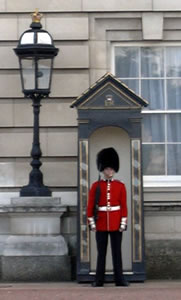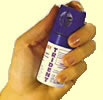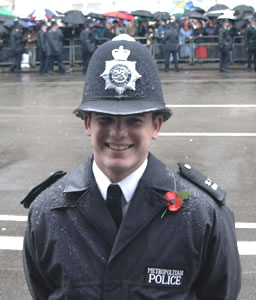
|

|
|
Study, work or travel in the UK. British
culture and life.
|
|
|||||
|
|
|
|
|||||
 |
|||||||
|
|
|
||||||
|
|||||||
 |
|||||||
|
Personal
/ Safety
|
|||||||
|
Keeping yourself and your belongings safe in the UK
|
|||||||
|
Sections:
|
Introduction |
 |
| Personal attack | ||
| Prevent a theft | ||
| After a theft | ||
| Accident | ||
| Meeting a stranger | ||
| Crime | ||
| Racism | ||
| Terrorist attack / war / natural disaster | ||
| Further information | ||
| Links |
 A guard at Buckingham Palace, London |
 |
Savvy! Authors: Fiona Bruce, Jacqui Hames Publisher: Transworld Publishers Date: June 2008 |
 |
A
Girl's Gotta Do What a Girl's Gotta Do: A Complete Guide to Personal Safety
for Women Author: Kathleen Baty Publisher: Rodale (US) Date: August 2004 |
- Street awareness
When you are walking in the street, appear confident. Some thieves target
tourists or strangers.
Do not look lost. Plan your journeys, and carry a map (but avoid studying
it too obviously).
Try not to carry items which identify you as a foreign student (eg rucksacks
(backpacks) with the name of a language school).
Walk on well-lit roads, especially late at night. Even if you are riding
a bicycle, you should try to avoid quiet roads.
Be aware of the people around you (in cars or on bikes as well as other
pedestrians). Do not use a personal stereo when by yourself.
Keep away from dangerous areas (ask local people if there are places
to avoid).
Ignore rude people who shout abuse at you. Try to avoid gangs and groups
of drunken people. Show respect to other people at all times.
Dress sensibly: women are more likely to attracted unwanted attention
from men if they dress in a sexy way. It is easier to run away if you are not
wearing a tight skirt or high-heeled shoes.
 |
 |
- Cars
Do not get into a stranger's car.
If someone offers to give you a lift home or to take you out somewhere in a
car, don't worry about refusing if you have any doubt about your safety.
You can say something like: "Thank you, but I prefer to walk".
- Pubs and clubs
Do not leave your drink in a pub or club. Ask a friend to watch your
drink if you want to dance or go to the bar or toilet.
Someone may try to add drugs or strong alcohol to your drink (this is known
as spiking the drink). Sometimes date-rape drugs can be used to
make it easier to rape someone (for information about this issue, see: http://www.roofie.com).
Avoid arguments or fights. Always show respect to other people, and be
prepared to apologise if it will help to calm down a situation.
- Private property
Do not enter someone's private property (for example, their home) unless
you feel that you can trust that person. Keep out of a stranger's bedroom.
Depending on the situation, you can say something like: "If you don't mind,
I'll wait for you outside" or "I'm afraid that it's time for me to
go home" or "Can we go to a pub instead?"
Do not write your first name on your letterbox, so that a stranger doesn't
know if there is a man or woman living there.
- Take a photo / send a text
If you have a camera phone you can use this to take a picture, for example:
- a photo of a person you have met for the first time or of someone you are
about to let into your home
- a photo of a car / number plate / taxi license number
You can send the photos (and any text you wish to add) to the service described
in the following link: http://www.bakoff.co.uk
If the person knows that you have done this it may deter that person from attacking
you. If you are the victim of an attack, the information you sent can be supplied
to the police, even if your phone is stolen.
Back to top
- Hold on to your bag
Women and foreigners are most commonly targeted by thieves (pickpockets).
Keep your bag in front of you in crowded areas, with the fastening near
your body. Be particularly careful with rucksacks (backpacks) - do not wear
them on your back in busy areas. Close your bag securely. Sometimes thieves
use knives to get in or to cut straps, but if you keep your bag open they can
just use their hands. Pickpockets often hold things so that their hands cannot
be seen.
Be careful if anyone push you or try to distract your attention. For
example, someone may drop coins on the ground, spill a drink, knock your shoulder,
ask you to take a photograph, or ask for directions. Another person may be stealing
your things while this is happening. Never allow anyone to distract you while
you are taking money out of a cash machine. Thieves often operate in small groups,
and may use young children (they have small hands, can easily approach you without
you noticing, and it is rare for them to be sent to prison). Thieves often wear
caps or coats with hoods to try to avoid being identified on security cameras.
If you think someone is acting suspiciously, hold onto your bag and move away
quickly.
Be careful in crowded areas: for example, in stations during the rush
hours (8-9am, 5-7pm), in busy shopping areas (such as Oxford Street), in tourist
areas (such as Trafalgar Square, Leicester Square or Baker Street), in airports
and in hotel lobbies. On the London Underground there are most crimes at Victoria,
Leicester Square, Oxford Circus, King's Cross and Piccadilly Circus. Be careful
in a café, internet café, cinema, pub
or other place of entertainment where your attention may not be on your bag
- do not leave your bag on the floor.
Do not leave your bag unattended in a public place, even if you want to
go to the toilet. It may be stolen, or if it is considered suspicious it may
be destroyed by police.
Don't have your name and address visible on any luggage tags (or
on your keys). A thief may read it and target your home while you are travelling.
- Money / jewellery
Try to keep your valuables out of sight.
Be careful if you are wearing jewellery or an expensive watch (someone may try
to snatch these from your body).
Be careful after you have used your wallet or purse. Someone may be watching
where you put it and may start to follow you.
Be careful after you have withdrawn cash from a bank or cash machine. If possible
use a machine which is inside a bank (avoid busy places such as stations).
Do not to carry a lot of cash with you. If you have a bank account, you can
use your debit card for most of your shopping.
Use travellers' cheques to carry money from abroad, or transfer money electronically
if you have a UK bank account.
Be suspicious of anyone who offers to help you to use a ticket machine or a
cash machine. Tell the person you don't want any help.
The safest way of keeping your money is to use a money-belt.
For more details about keeping your money safe, see: Life/Money.
Do not enter your credit card details in an e-mail.
Do not write your credit card details on an internet page which is not secure.
If a page is secure, this lock mark should appear at the bottom of your screen:
![]() .
.
- Mobile phones / electronic goods
Keep your mobile phone with you, but be careful about using it in busy places.
Thieves sometimes wait outside busy stations or places of entertainment and
look for people using phones when they come out. Theft of mobile phones is quite
common. Your phone could be taken from your bag, or snatched from your hand
or a table.
Make sure that you hold your bag securely and that you are aware of people around
you while you are talking on your phone.
If you notice a CCTV (closed circuit television) camera, stand in the
view of the camera while you are using your phone.
Note down your mobile phone's 15-digit IMEI number. For details, see:
Life/Telephone/Mobile.
Use the security lock on your phone. This will stop someone else from
using your phone. This is especially important if you have a mobile phone contract
(not a pay-as-you-go phone).
If your phone has been stolen, call 08701 123123 and you can stop it being used
by the thief (even if the SIM card is changed). You should do this even if it
is a pay-as-you-go phone. For details, see: http://www.immobilise.com.
Put security marks on your mobile phone, laptop, electronic dictionaries,
personal data assistant, camera or other expensive equipment which you carry
with you. For details of how to do this, see: Life/Telephone/Mobile.
Avoid using a laptop on trains or in public places.
Make sure that your insurance will cover the cost of replacing any expensive
electronic goods which you carry with you.
 London policeman |
It is important to report the theft to the police as soon as possible:
- there is more chance that the thief can be caught (especially if the theft
is reported immediately)
- your things can be returned to you if they are found and handed to the police
- your insurance company or bank will not pay you for your loss if you don't
report the crime
If you (or someone else) saw your things being taken and the criminal is still
there, contact a policeman immediately or phone 999. This number
can be called from a public telephone without needing to enter any money.
Otherwise, you can report the crime either by going to your nearest police
station. To find your nearest police station, see: Personal/Advice.
You will be given a crime form to complete. You will have to give your
UK address and telephone number, the date and time of the theft, the place where
it occurred, the type of things stolen, and a full description (mention any
security markings or serial numbers, for example your mobile phone's 15-digit
IMEI number).
The form will be stamped by the police station. There will be a crime number
at the top of the form. You will be given the original copy of the form, and
a copy will be kept at the police station.
- Insurance company / bank
If your purse or wallet is stolen and it contains debit cards or credit cards,
contact your card providers as soon as possible and cancel your cards. This
is easier if you have taken out a card protection service: you can just
call one number to cancel your cards (ask your bank if they offer such a service).
You should be sent replacement cards within a couple of weeks. Before these
arrive, you will need to go to your bank personally to withdraw money. If your
cards have been used by the thief, contact the card company to see if you can
get this money back. The cards issued by UK banks are normally automatically
insured, so you should receive a refund of all or most of the money stolen using
the card, unless you have been careless with your PIN. Cards issued by non-UK
banks often do not offer this protection.
Report the crime to your insurance company. Check your policy details
first to make sure that you are covered. The insurance company may want you
to send a copy of the crime form or may ask for the crime number. Do not send
the original copy of the form to them: you may need this.
- Mobile phone company
If your mobile phone has been stolen, contact your network provider (see: Life/Telephone)
as soon as possible and tell them the phone number and the IMEI number of your
stolen phone (for details of IMEI numbers, see: Life/Telephone).
The company may be able to block calls made from that phone.
Back to top
If possible, tell someone when you are going out, where you are going,
who you are meeting and when you expect to return. People may worry if you go
away unexpectedly. Be especially careful when meeting someone for the first
time. Arrange to meet in a public place, ideally in daylight. If possible, take
a friend with you.
Be careful about who you give your personal details. Your name, address,
telephone number and e-mail address can be used to contact you. Only give these
details to someone if you want to be contacted. If you dial 141 before
you dial a telephone number, your number cannot be seen by the person receiving
your call.
For more information on safety issues for women, see: Personal/Relationships/Women
(this page includes a discussion of sexual matters).
Avoid any involvement with drugs (taking them yourself, carrying them,
or selling them to others). Many violent crimes are connected with drugs, and
many drugs can damage your health or kill you.
Be careful about accepting a job advertised as massage, escort, model or dancing.
Some of the jobs advertised in this way are an illegal part of the sex industry.
Avoid taking any jobs which pay cash illegally, without paying the proper taxes.
Report any crimes as soon as possible to your local police station. For
details about how to contact the police, see: Personal/Advice.
Britain has a mixed population: there are people of many different skin colours
and religions living in the UK. About 7% of the population is non-white, and
the percentage is higher in London and other big cities. British people are
generally kind to foreigners who behave politely and respect the local culture.
However, there are some people (racists) who do not like foreign people
who live in the UK, either as immigrants (people who have come from another
country to live permanently in Britain) or as visitors. Racist behaviour is
more common in areas where there are many immigrants or in towns where there
are many international students
Sometimes you may hear people calling you a rude name. These are some
of the slang expressions which are sometimes used for foreigners (do not use
these, as they usually sound offensive): Japanese: Nip, Jap; Chinese: Chink;
Spanish/Italian: Dago; German: Kraut, Hun; French: Frog; Pakistani: Paki; Russian:
Rusky. If people call you names, it is usually safer either to ignore them or
to report them to the police or to someone nearby. Often the people calling
these names cannot tell where you are from, so will probably confuse Japanese
or Koreans for Chinese, for example, or Indians for Pakistanis. Note that in
the UK the word Asian usually refers to people from the Indian sub-continent
(eg India, Pakistan, Bangladesh). The term Far Eastern or Oriental is often
used for people from East Asia (eg Japan, Korea, China, Malaysia).
The BNP (British National Party), the National Front and Combat 18 are examples of far-right groups which have racist policies. You are more likely to experience racial problems if you are living in an area where many people supporting these groups (probably where there are many immigrants or foreign visitors).
|
|
|